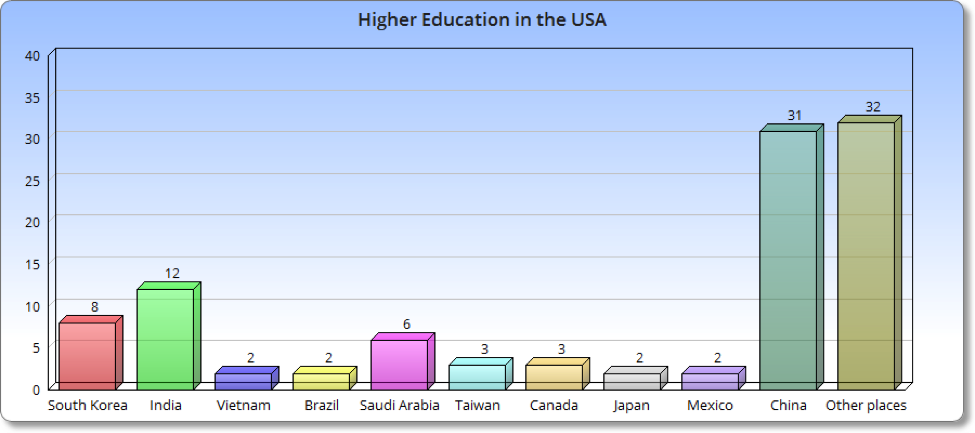With nearly 900,000 international students enrolled in various colleges and universities, the United States is indisputably one of the most favored locations for students from world over. China, in particular, has shown a staggering growth. Since 2007, the numbers of Chinese international students have grown by 20% or more every year.
They don’t have it easy. Numbers also point to nearly 24% of Chinese students enrolling in Graduate studies, dropping out and 80% of them returning to China. Language, food, and distinctive looks are cultural barriers, as is the generic notion that they lack social communication skills and don’t party.
So why does the influx still keep growing? There are a number of reasons, personal, societal and geo-political which contribute to the trend:
Chinese Value Education
Not surprisingly, the major reason why several Chinese kids prefer to study in the United States is the general standard of curriculum, resources, teaching faculty and internship/ experience/ job opportunities it opens up. Chinese parents are actually pretty particular about imparting solid foundations in primary and secondary level, which they often find better in China. But for advanced degrees, USA is their preferred destination.
Excellent Research Opportunities for STEM Fields
For science, technology, engineering and math, Chinese students go through a rigorous early curriculum. Unlike in the US, high expectations are the norm in China. This means they are better equipped to excel in advanced education in those fields. Except, outside of elite schools there aren’t too many avenues to learn at that level. US universities and colleges provide that.
Improving Social/ Communication Skills
For years, China was sidelined in the race to offshore/ outsourced job positions because western countries found the subcontinent or international hubs like Singapore easier for reasonable spoken English standards, which they could then refine. Loss of valuable revenue forced the government and the parents of the next generation to re-think their strategies. The result is a boom in pushing your kids to study in the U.S. and pick up the necessary social skills and fluency in English required at jobs.
Freedom of Expression, Individualism and Liberty of Thought
Communism may have given way to the thriving capitalism since mid-1980s, but politically and socially China still remains fairly stifling. Free spirits, radical thinkers and fiercely individual academics are often sidelined, curbed or even threatened. Books, internet and other resources place bans on information not conducive to the socio-political machinery. No wonder the Chinese students look up to American universities as the place they can learn, express themselves and be liberated. The political rivalry between the countries ironically convinces students from China to value the autonomy of American students and minimal interference in their education system even more. At the same time, more parents also look at the United States as a preferred destination where liberal arts or holistic education can foster true growth rather than the rigid undergraduate curriculum in China.
Post-education Opportunities
Needless to say, they also keep an eye out for the several big companies, which conduct interviews at campuses and scout the prominent colleges.
Cost of Education
The cost of education in an average U.S. university is a bargain for any middle class Chinese family. Given that they still mostly have one child, the family often focuses all its funds and efforts towards their education, even sacrificing their luxuries. Community colleges in the U.S. are dirt cheap as well. Compare this to countries like India, Brazil or Saudi Arabia, whose currency exchange makes the education in the U.S. much more expensive, and it’s easy to see why the Chinese students love it here.
Stringent Immigration Rules in UK/ Australia
Options for English speaking countries have been limited further with Britain and Australia tightening their immigration and visa laws. Plus the U.S. has a sturdy support system for international students based on their long history and experience of handling international students.
All of these factors above combine to make the American colleges and universities a best-case concurrence of cost, resources, quality and reputation which the Chinese students relish.

